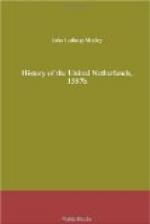In the Netherlands, meantime, discord and confusion had been increasing every day; and the first great cause of such a dangerous condition of affairs was the absence of the governor. To this all parties agreed. The Leicestrians, the anti-Leicestriana, the Holland party, the Utrecht party, the English counsellors, the English generals, in private letter, in solemn act, all warned the Queen against the lamentable effects resulting from Leicester’s inopportune departure and prolonged absence.
On the first outbreak of indignation after the Deventer Affair, Prince Maurice was placed at the head of the general government, with the violent Hohenlo as his lieutenant. The greatest exertions were made by these two nobles and by Barneveld, who guided the whole policy of the party, to secure as many cities as possible to their cause. Magistrates and commandants of garrisons in many towns willingly gave in their adhesion to the new government; others refused; especially Diedrich Sonoy, an officer of distinction, who was governor of Enkhuyzen, and influential throughout North Holland, and who remained a stanch partisan of Leicester. Utrecht, the stronghold of the Leicestrians, was wavering and much torn by faction; Hohenlo and Moeurs had “banquetted and feasted” to such good purpose that they had gained over half the captains of the burgher-guard, and, aided by the branch of nobles, were making a good fight against the Leicester magistracy and the clerical force, enriched by the plunder of the old Catholic livings, who denounced as Papistical and Hispaniolized all who favoured the party of Maurice and Barneveld.
By the end of March the envoys returned from London, and in their company came Lord Buckhurst, as special ambassador from the Queen.
Thomas Sackville, Lord Buckhurst—afterwards Earl of Dorset and lord-treasurer—was then fifty-one years of age. A man of large culture-poet, dramatist, diplomatist-bred to the bar; afterwards elevated to the peerage; endowed with high character and strong intellect; ready with tongue and pen; handsome of person, and with a fascinating address, he was as fit a person to send on a mission of expostulation as any man to be found in England. But the author of the ’Induction to the Mirror for Magistrates’ and of ‘Gorboduc,’ had come to the Netherlands on a forlorn hope. To expostulate in favour of peace with a people who knew that their existence depended on war, to reconcile those to delay who felt that delay was death, and to, heal animosities between men who were enemies from their cradles to their graves, was a difficult mission. But the chief ostensible object of Buckhurst was to smooth the way for Leicester, and, if possible, to persuade the Netherlanders as to the good inclinations of the English government. This was no easy task, for they knew that their envoys had been dismissed, without even a promise of subsidy. They had asked for twelve thousand soldiers and sixty




